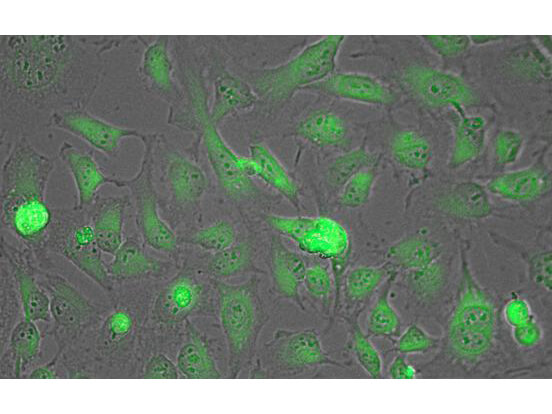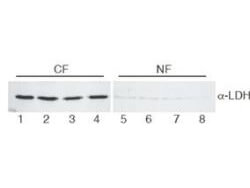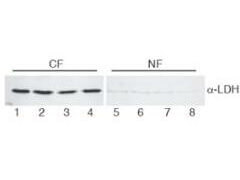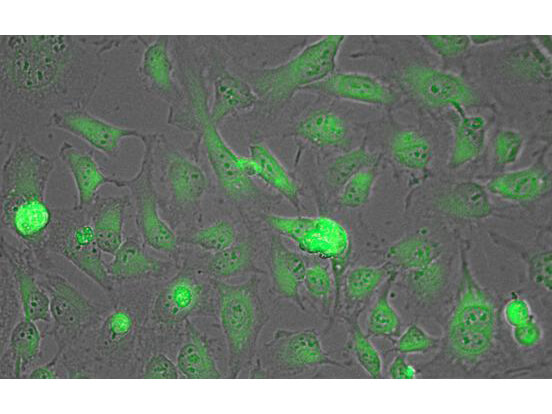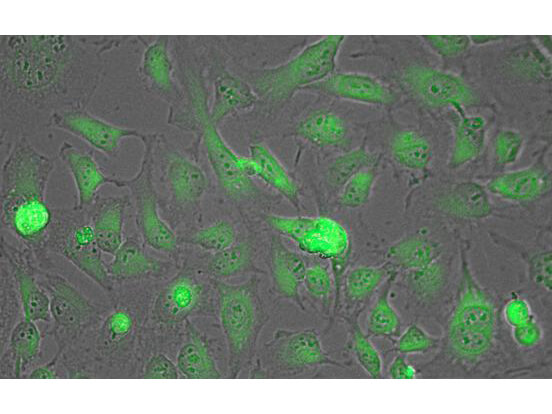Datasheet is currently unavailable. Try again or CONTACT US
Lactate Dehydrogenase Antibody
Goat Polyclonal
6 References
200-1173
200-1173S
200-1173-0100
50 mg
25 µL
100 µg
Lyophilized
Liquid (sterile filtered)
Lyophilized
WB, ELISA, IF, Other
Human, Rabbit
Goat
Shipping info:
$50.00 to US & $70.00 to Canada for most products. Final costs are calculated at checkout.
Product Details
Anti-Lactate Dehydrogenase (Rabbit Muscle) (GOAT) Antibody (BULK ORDER) - 200-1173
goat anti-Lactate Dehydrogenase Antibody, L-lactate dehydrogenase A chain, LDH-A, LDH muscle subunit, LDH-M
Goat
Polyclonal
IgG
Target Details
LDHA - View All LDHA Products
Human, Rabbit
Native Protein
This antibody was prepared from whole goat serum produced by repeated immunizations with a full length lactate dehydrogenase protein isolated from rabbit muscle.
Anti-LACTATE DEHYDROGENASE is an IgG fraction antibody purified from monospecific antiserum by a multi-step process which includes delipidation, salt fractionation and ion exchange chromatography followed by extensive dialysis against the buffer stated above. Assay by immunoelectrophoresis resulted in a single precipitin arc against anti-Goat Serum as well as purified and partially purified Lactate Dehydrogenase [Rabbit Muscle]. BLAST analysis was used to determine that cross reactivity is suggested for both muscle and heart isoforms (LDH-A and LDH-B) from most mammalian species.
Application Details
ELISA, IF, WB
Other
- View References
LACTATE DEHYDROGENASE antibody is suitable for use in ELISA, western blot, and immunofluorescence. Specific conditions for reactivity should be optimized by the end user. Expect a band approximately 36 kDa in size corresponding to LDH western blotting in the appropriate cell lysate or extract.
Formulation
10.0 mg/mL by UV absorbance at 280 nm
0.02 M Potassium Phosphate, 0.15 M Sodium Chloride, pH 7.2
0.01% (w/v) Sodium Azide
None
5.0 mL
Restore with deionized water (or equivalent)
Shipping & Handling
Ambient
Store vial at 4° C prior to restoration. For extended storage aliquot contents and freeze at -20° C or below. Avoid cycles of freezing and thawing. Centrifuge product if not completely clear after standing at room temperature. This product is stable for several weeks at 4° C as an undiluted liquid. Dilute only prior to immediate use.
Expiration date is one (1) year from date of receipt.
Lactate dehydrogenase is also known as L-lactate dehydrogenase A chain, LDH-A, LDH muscle subunit and LDH-M. Two isozymes of LDH occur in mammals, LDH-M and LDH-H which come together to form a homotetramer of 36 kDa subunits. Every LDH molecule consists of four subunits, where each subunit is either H or M (based on their electrophoretic properties.) There are, therefore, five LDH isotypes: LDH-1 (4H) - in the heart, LDH-2 (3H1M) - in the reticuloendothelial system, LDH-3 (2H2M) - in the lungs, LDH-4 (1H3M) - in the kidneys and LDH-5 (4M) - in the liver and striated muscle. Usually LDH-2 is the predominant form in the serum. An LDH-1 level higher than the LDH-2 level (a ''flipped pattern'') suggests myocardial infarction (damage to heart tissues releases heart LDH, which is rich in LDH-1, into the bloodstream). LDH complex works to prevent muscle failure and fatigue. LDH can be measured when released during tissue breakdown. LDH appears normally throughout the body, and LDH levels rise with many cancers, so it can be used as a tumor marker but not as a cancer identifier. Anti-Lactate Dehydrogenase Antibody is useful for researcher interested in cancer and metabolism research.
Cheng Z et al. (2021). Normobaric oxygen therapy attenuates hyperglycolysis in ischemic stroke. Neural Regan Res.
Applications
WB, IB, PCA
Foreman JE et al. (2021). Diminished Hepatocarcinogenesis by a Potent, High-Affinity Human PPARα Agonist in PPARA-Humanized Mice. Toxicol Sci.
Applications
WB, IB, PCA
Foreman JE et al. (2021). Species Differences between Mouse and Human PPARα in Modulating the Hepatocarcinogenic Effects of Perinatal Exposure to a High-Affinity Human PPARα Agonist in Mice. Toxicol Sci.
Applications
Undefined
Miyauchi-Nanri Y et al. (2014). CUL4A-DDB1-Rbx1 E3 ligase controls the quality of the PTS2 receptor Pex7p. Biochem J.
Applications
WB, IB, PCA
Yagita, Y et al. (2013). Tail-anchored PEX26 targets peroxisomes via a PEX19-dependent and TRC40-independent class I pathway. The Journal of Cell Biology
Applications
WB, IB, PCA
Miyata N et al. (2005). Shuttling mechanism of peroxisome targeting signal type 1 receptor Pex5: ATP-independent import and ATP-dependent export. Mol Cell Biol.
Applications
WB, IB, PCA
This product is for research use only and is not intended for therapeutic or diagnostic applications. Please contact a technical service representative for more information. All products of animal origin manufactured by Rockland Immunochemicals are derived from starting materials of North American origin. Collection was performed in United States Department of Agriculture (USDA) inspected facilities and all materials have been inspected and certified to be free of disease and suitable for exportation. All properties listed are typical characteristics and are not specifications. All suggestions and data are offered in good faith but without guarantee as conditions and methods of use of our products are beyond our control. All claims must be made within 30 days following the date of delivery. The prospective user must determine the suitability of our materials before adopting them on a commercial scale. Suggested uses of our products are not recommendations to use our products in violation of any patent or as a license under any patent of Rockland Immunochemicals, Inc. If you require a commercial license to use this material and do not have one, then return this material, unopened to: Rockland Inc., P.O. BOX 5199, Limerick, Pennsylvania, USA.

